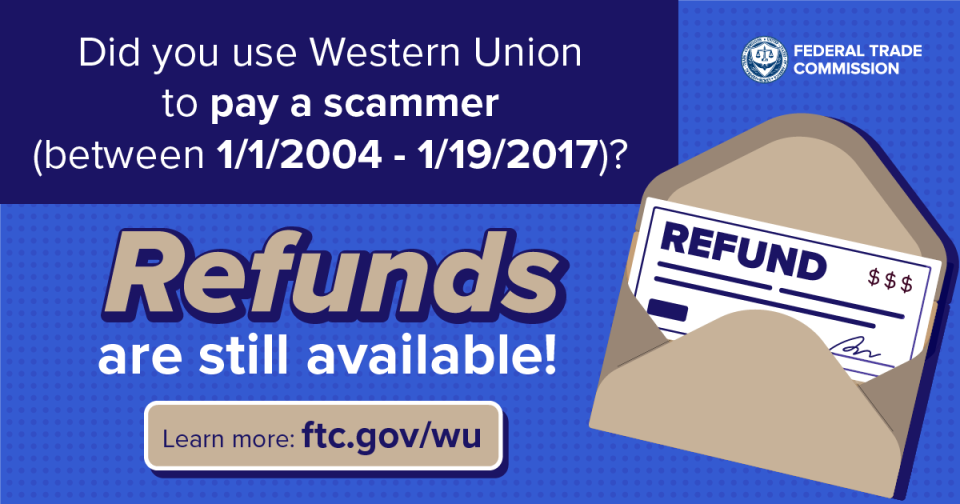

Refunds are still available to people who were tricked into wiring money to scammers through Western Union between January 1, 2004 and January 19, 2017. If you didn’t file a claim for a refund yet, you have until July 1, 2022 to file. The refunds are part of a $586 million settlement Western Union reached with the FTC and Department of Justice in 2017 for violating the law when it failed to guard against fraud in its system.
If you got a prefilled claim form in the mail — showing eligible dollar loss amounts, based on the report(s) you filed with Western Union — you can use it to submit your claim. But if you didn’t get a form in the mail, you can file a claim online at westernunionremissionphase2.com. If you have any questions about the claims process or what to do if you disagree with the loss amount printed on the claim form, visit the Frequently Asked Questions on the Western Union Remission Phase 2 website.
Your form must be completed online or postmarked
on or before July 1, 2022.
Avoid refund scams:
For more information about eligibility and the claims process go to ftc.gov/wu.
Search Terms Comments have been turned off for this consumer alert.It is your choice whether to submit a comment. If you do, you must create a user name, or we will not post your comment. The Federal Trade Commission Act authorizes this information collection for purposes of managing online comments. Comments and user names are part of the Federal Trade Commission’s (FTC) public records system, and user names also are part of the FTC’s computer user records system. We may routinely use these records as described in the FTC’s Privacy Act system notices. For more information on how the FTC handles information that we collect, please read our privacy policy.
The purpose of this blog and its comments section is to inform readers about Federal Trade Commission activity, and share information to help them avoid, report, and recover from fraud, scams, and bad business practices. Your thoughts, ideas, and concerns are welcome, and we encourage comments. But keep in mind, this is a moderated blog. We review all comments before they are posted, and we won’t post comments that don’t comply with our commenting policy. We expect commenters to treat each other and the blog writers with respect.
We don't edit comments to remove objectionable content, so please ensure that your comment contains none of the above. The comments posted on this blog become part of the public domain. To protect your privacy and the privacy of other people, please do not include personal information. Opinions in comments that appear in this blog belong to the individuals who expressed them. They do not belong to or represent views of the Federal Trade Commission.